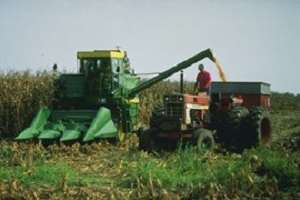Farming is one of the most dangerous occupations in the country. Each year approximately 10% of U.S. farm deaths are in Pennsylvania. Do your part and make your farm as safe as possible.

You are probably aware that farming is one of the most dangerous occupations there is in this country. An even though we know about Tractor, Machinery, and All Terrain Vehicle (ATV) hazards on the farm, we don’t seem to be able to lower the farm death statistics. Every year, consistently, about 400 people are killed in farm accidents involving farm tractors and machinery. Yet this is just not a mid-west farm belt problem, because every year about 30 – 40 of those deaths are in Pennsylvania. That’s about 10% of the national total right here in Pa. Additionally, another 400-500 are killed on ATV’s nationwide, with Pa. ranking 3rd in the nation. These are horrific disturbing statistics!
Consequently, let’s talk about some farm statistics to help us understand what is going on. About 70% of farm fatalities involve the tractor, and of these fatalities, about 70% of those are tractor rollovers. That equates to about 200 of the 400 total farm deaths involve a tractor rollover. Doubtless not a surprise, but spring and fall are the worst times of the year for fatalities when spring planting, baling and then fall harvests are taking place. Interesting to note that right after lunch time and evening is the time of day when most accidents occur. We’ve all experienced the after lunch food coma, and obviously the evening is when we are pushing and in a hurry to finish a job, a field, or beat the oncoming rain. Often cutting corners and taking more risk to finish a long day when we are most tired. Friday and Saturday are the days most accidents occur. Maybe our minds are on ending a long week or on weekend plans instead of the job at hand. As for age, most fatalities are in 2 various age groups. One of those is the 50 -70 year old group. This stands to reason as the average age of the American farmer is 58 and about at that midpoint. The scariest statistic is the other age group for high fatalities: that is 20 and under, with many of these kids not old enough to have a driver’s license. Farming is the only dangerous occupation where we allow kids to run heavy equipment. They are not allowed underground in mines. They are not allowed to work heavy construction. But they are running farm equipment. We need to do a better job of taking the time to teach and train youth running farm equipment!
Since most fatalities involve a tractor rollover we should have a better understanding of how a rollover occurs, so we can avoid the situation in the first place. There are the physical hazards we come upon out in the fields and travelling on roads. There are holes, rocks, and logs our wheels hit that can unstable the tractor. Ground around banks and ditches can give way. Ground slope needs to be observed and hitched equipment, loads on the front, and spray tanks change the handling of the tractor. Additionally, driving on a road with unforgiving car traffic is an experience all of its own.
Dennis Murphy in the Penn State Ag Engineering Department is one of the most highly respected experts on farm safety. He wrote a concise informative paper on tractor rollovers that should be required reading for everyone. Whether, you have been driving tractors for 60 years or a novice, you should read this article. The link for it is http://extension.psu.edu/business/ag-safety/vehicles-and-machinery/tractor-safety/e34
The information in the article simply explains the dynamics of how a rollover occurs. Every tractor has stability lines, which are 4 lines drawing an imaginary box around your tractor. The lines are across your front and rear axles and from your front to rear tires. Additionally, every tractor has a center of gravity. When the center of gravity goes over one of the stability lines – you will have a rollover. The center of gravity will move depending on if you raise equipment, a loader, are on a slope, etc. The higher the center of gravity is- the quicker it can go over your stability lines. There are also 3 forces that act against you. Centrifugal force (turning) and speed act against you for a sideways rollover. Rear axle torque and drawbar leverage are instrumental in an overturn to the rear. Hitching or wrapping a chain to something other than the drawbar has caused many rear overturns and fatalities. With the center of gravity usually closer to the rear axle, it usually takes less than ¾ of a second to be involved with a rear overturn.
ATV’s have become a more prevalent piece of equipment on many farms. The same principals involving tractor rollovers apply to ATV’s. Except that the stability lines on ATV’s are closer, and your center of gravity is astronomically high. Then you add in the speed they go, the fact that we like to make sharp turns (centrifugal force), and usually our attitude with ATV’s is that they are a recreational play vehicle. Furthermore, we let young kids use them and they usually go too fast, and many times the machines are too big for their size and strength. These are some of the reasons ATV fatalities and emergency room visit statistics read like a script to a horror movie.
Farming is a dangerous business that involves many farm families. Therefore, there are always young and inexperienced people involved in your operation also. You need to talk safety, teach safety, practice safety yourself, lead by example, and make it the most important part of your daily operation, because you can’t afford the alternative. Neither your corn production numbers, your forage production numbers, nor your milk production numbers are more important than you becoming a farm fatality number. Be careful out there!
Source: psu.edu